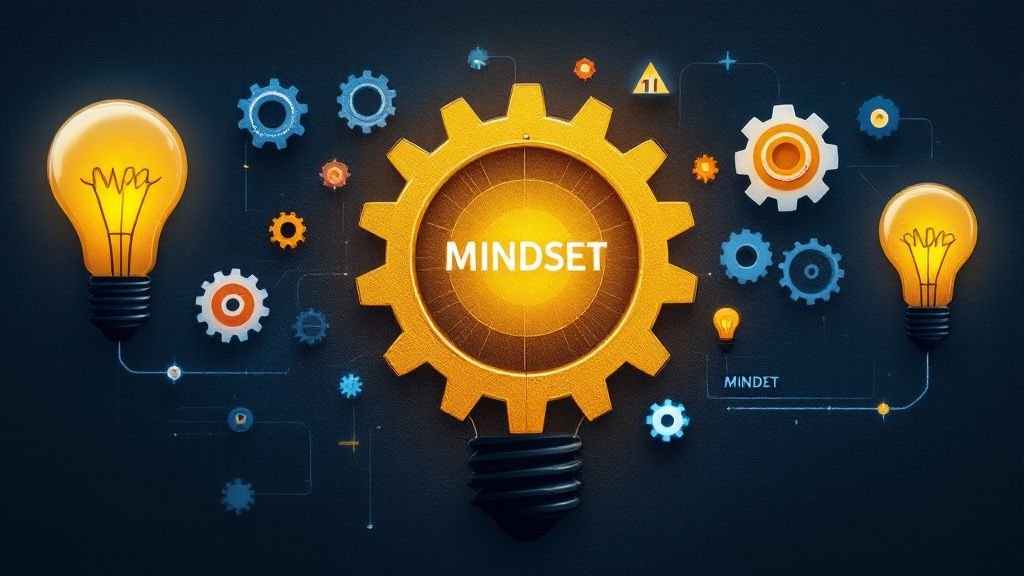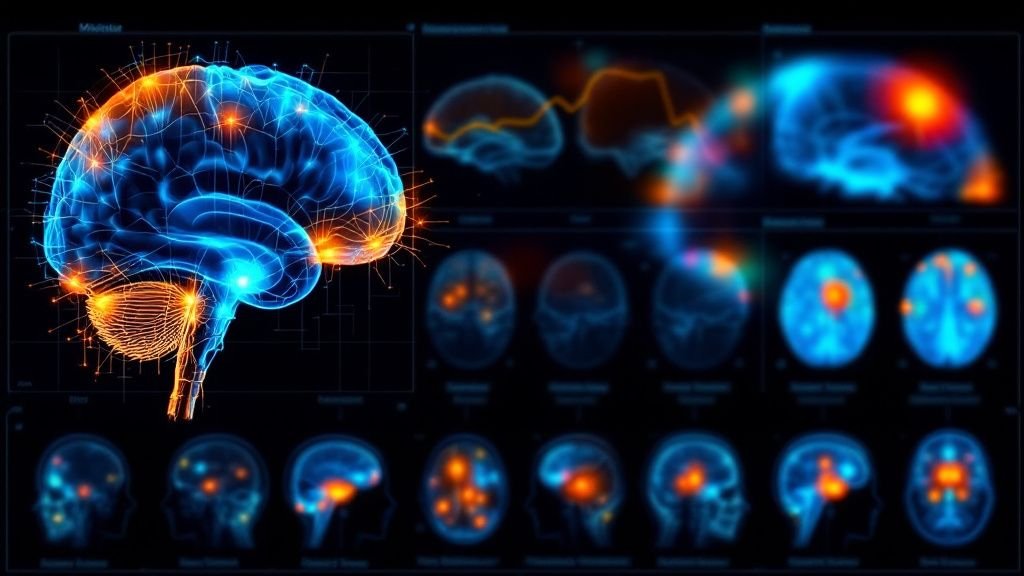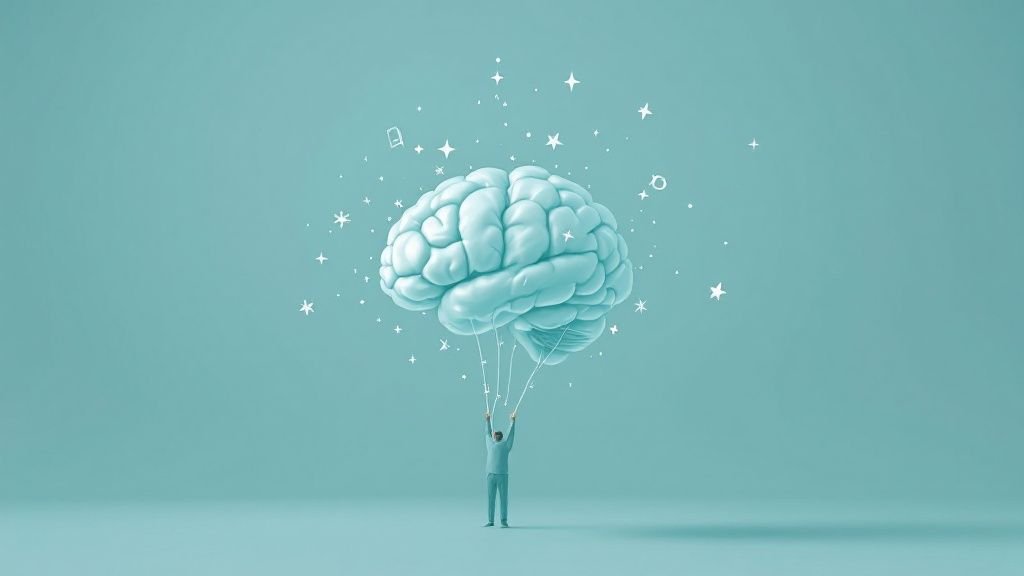The intricate dance between brain function and mindset is a captivating exploration into how the brain plays a critical role in shaping our perspectives. The brain serves as a powerful engine for mindset shifts, fueled by neural pathways that guide thought patterns and behaviors. Mindset coaching services utilize this neural architecture to foster personal growth, employing mindset development tools that enhance cognitive processes and promote positivity. The impact of brain chemistry on mindset is profound, encompassing the neuroscience of mindset, which reveals how mindset and brain health interlink. Through understanding how mindset affects brain function, individuals can embark on transformative journeys, using mindset strategies for brain improvement and harnessing the brain’s role in a positive mindset. Embracing the potential for mindset alteration through brain training unlocks pathways to resilience and well-being, reshaping one’s mental outlook with the aid of brain science.

Understanding Mindset and Its Importance
The essence of mindset lies in its ability to shape how individuals perceive and interact with the world. Acting as a mental framework, mindset influences everything from personal beliefs to how challenges are approached. It plays a crucial role in happiness and success, closely tied to brain function and mindset development. Delving into how the brain plays into mindset reveals pathways for growth through Mindset development tools and approaches.
Neuroscience of mindset underscores its importance in promoting mental flourishing. On one hand, fixed mindset perspectives see abilities as static, while growth mindset advocates argue that abilities can be developed through effort and learning. Understanding these differences reveals the brain’s role in mindset development and its powerful impact on mindset shifts and chemistry.
Mindset and brain health are intertwined, affecting cognitive processes and emotional well-being. Positive mindsets leverage neurological pathways to enhance brain function, making mindset alteration through brain exercises a profound tool for personal transformation. Mindset coaching services often employ strategies to strengthen these pathways, advocating for growth and adaptability in facing life’s challenges.
Exploring the impact of mindset strategies for brain improvement highlights the transformational potential within each individual. By harnessing how to reshape mindset with brain science, individuals can uncover hidden reserves of resilience and positivity, turning obstacles into opportunities for success and fulfillment.

The Science Behind Mindset
The intriguing science behind mindset delves into how neural pathways influence our perceptions, attitudes, and behaviors. These pathways are constantly shaped by our experiences and thoughts, illustrating how mindset shifts and brain chemistry are interconnected. A core focus of neuroscience of mindset is understanding how these mental patterns are formed and altered. This understanding provides insight into how mindset affects brain function and the Impact of brain on mindset.
Mindset and brain health are intricately linked, with positive shifts unleashing potential for personal growth and mental well-being. Exploring mindset strategies for brain improvement reveals that developing a resilient mindset can strengthen cognitive processes and improve mental acuity. By engaging in mindset alteration through brain exercises, individuals can consciously reshape their perspectives over time.
A closer examination of Carol Dweck’s research on growth mindset reveals valuable insights into how mindset coaching services can facilitate change. Dweck’s findings demonstrate that students who embraced growth mindsets significantly improved their academic performance, highlighting the potential of mindset development tools in education. This case study underscores the transformative power of mindset strategies in real-world applications, illustrating the profound impact of brain function and mindset development on individual success.

Mindset Changes Through Life Stages
Mindset shifts occur naturally through various life stages, driven by evolving experiences and neurological development. During childhood, the brain is incredibly malleable, with rapid formation of neural pathways influencing fundamental cognitive processes and mindset development. How the brain plays into mindset during these stages is critical, establishing the foundation for later life adaptability and resilience. Early mindset coaching services can effectively nurture this growth, promoting a robust foundation for continued brain health.
Adolescence brings increased awareness and emotional complexity, heralding significant mindset shifts and brain chemistry changes. This phase sees individuals questioning established beliefs and forming their unique worldview. The impact of brain on mindset during adolescence is immense, as the brain’s development emphasizes adaptability and redefines personal goals. Changing mindset through brain training and exercises can guide teens in solidifying their self-identity in positive directions.
In adulthood, mindset strategies for brain improvement can help combat the stagnation that sometimes accompanies routine and responsibilities. Adults are empowered to reshape mindset with brain science, leveraging experience to foster personal growth and mental agility. In the next few years, adults are likely to increasingly utilize mindset development tools to engage in lifelong learning and adaptation, optimizing aging processes and broadening horizons.
During later life stages, the brain’s role in a positive mindset becomes even more essential. As aging alters cognitive processes, maintaining a vibrant mindset is crucial for mental and emotional health. Mindset alteration through brain exercises can cultivate continued growth and adaptability, empowering individuals to embrace the richness of life at any age. Mindset coaching services offer valuable support in navigating these transitions, ensuring an ongoing journey of growth and fulfillment.

Practical Ways to Shift Your Mindset
Shifting one’s mindset involves deliberate actions and a commitment to positive change. Engaging in practices such as mindfulness and meditation can significantly alter neural pathways, illustrating how the brain plays into mindset. These practices enhance focus and emotional regulation, fostering a mindset shift towards growth and resilience. Mindset coaching services often incorporate such techniques, showing how mindset affects brain function by reinforcing healthier thought patterns.
An essential strategy for transforming mindset includes surrounding oneself with positive influences. This not only boosts motivation but also cultivates a shared vision of success and happiness. What most people don’t see about mindset development tools is the crucial behind-the-scenes insight into the mental reprogramming they facilitate, which makes all the difference. By reinforcing positive beliefs and attitudes, individuals can create a fertile ground for mindset shifts and brain chemistry optimization.
Consistent personal reflection and goal setting are powerful methods for mindset alteration through brain exercises. Keeping a journal or engaging in visualization exercises can provide clarity and direction, aligning brain function with desired outcomes. These practices serve as pivotal mindset strategies for brain improvement, enabling individuals to reshape mindset with brain science, ultimately revealing untapped potential and unknown avenues for personal growth.
Engaging in continuous learning and exposing oneself to diverse experiences expands cognitive processes and encourages adaptability. This growth mindset approach challenges existing mental frameworks and fosters a dynamic, flexible outlook on life. Exploring how to reshape mindset with brain science invites an ongoing transformation, ensuring a lifetime of positive change and vibrant mental wellness. Mindset and brain health are thus intricately supported, highlighting the impact of brain on mindset throughout life’s journey.

Real-Life Examples of Mindset Transformation
The remarkable journey of mindset transformation is often illuminated through real-life examples that showcase the profound impact of mindset shifts on personal and professional success. One inspiring story is that of Oprah Winfrey, who overcame immense obstacles by cultivating a resilient mindset. Her journey exemplifies how mindset development tools and a positive mental framework can foster extraordinary achievement, underscoring the brain’s role in positive mindset evolution.
Another example is Michael Jordan, known for his tenacity and continuous growth-oriented mindset. Despite numerous setbacks, he embodied the power of changing mindset through brain training, which illustrated how mindset affects brain function. By consistently focusing on improvement, he harnessed the impact of brain on mindset, leading to a legendary basketball career that has inspired countless others.
Examining J.K. Rowling’s experiences reveals remarkable insight into the transformative power of mindset shifts and brain chemistry. Her perseverance and commitment to a creative vision amidst financial struggles highlight the neuroscience of mindset, showing how neural pathways and mindset, when aligned, can lead to extraordinary literary contributions. The Brain function and mindset development apparent in her success story provide a beacon of hope for aspiring individuals.
An unpopular opinion about mindset transformation is the notion that persistence is the sole ingredient for change. However, experts believe that understanding how to reshape mindset with brain science is equally crucial for authentic transformation. This emphasizes the necessity of strategic mindset alteration through brain exercises, which enhance mental agility and flexibility, ensuring that individuals are equipped for sustainable success.
Elon Musk’s mindset transformation story offers another compelling narrative. His relentless innovation showcases how mindset coaching services can propel visionary thinking and resilient mindset cultivation. Musk’s endeavors highlight the mindset strategies for brain improvement, demonstrating how breaking conventional barriers can lead to groundbreaking advancements. His approach reveals that true mindset transformation requires both an optimistic outlook and a methodical alignment of neurocognitive processes with ambitious aspirations.

The Future of Mindset Research
The future of mindset research is poised for transformative insights that will deepen our understanding of the brain’s influence on personal growth. Technological advancements in neuroscience are set to uncover how neural pathways facilitate mindset shifts, providing new dimensions in the field. Researchers are exploring brain function and mindset development with unprecedented precision, paving the way for innovative mindset development tools that can enhance brain health and personal well-being.
The current state of mindset research shows an increasing trend towards integrating neuroplasticity with mindset coaching services. This burgeoning fusion is anticipated to revolutionize the way individuals approach self-improvement, with brain science offering tangible strategies for altering mindset. By examining how mindset affects brain function, researchers are uncovering valuable interventions that could transform personal and professional landscapes.
Trend analysis in mindset science indicates growing interest in personalized brain training programs tailored to individual cognitive profiles. Scientists are delving deeper into mindset alteration through brain exercises that target specific neural pathways, promising breakthroughs in mindset strategies for brain improvement. This evolving field highlights the vast potential of neuroscience in reshaping mindset with brain science, offering a new horizon of possibilities for enhancing human potential and fostering enduring positive change.

Frequently Asked Questions
How does the brain play into mindset?
The brain shapes mindset by forming and strengthening neural pathways based on experiences and thought patterns. This dynamic process influences how individuals perceive challenges and opportunities, highlighting the integral role of brain function in mindset development. Through training and adaptation, the brain can facilitate positive mindset shifts.
What are mindset coaching services?
Mindset coaching services are specialized programs aimed at helping individuals cultivate a growth-oriented mindset. By utilizing various mindset development tools, these services guide clients in altering cognitive processes and behavior patterns. The ultimate goal is to enhance personal and professional outcomes through targeted mindset strategies.
How can mindset shifts affect brain chemistry?
Mindset shifts can trigger changes in brain chemistry by altering the production and balance of neurotransmitters associated with mood and motivation. Positive mindset adjustments promote the release of chemicals like dopamine, enhancing feelings of well-being and productivity. This transformation underscores the profound impact of brain on mindset.
What role does neuroscience play in mindset transformation?
Neuroscience provides a scientific basis for understanding how mindset changes occur at the neurological level. By examining neural pathways and brain activity, researchers identify how specific exercises and practices can alter mindset effectively. This knowledge empowers individuals to reshape mindset with brain science, fostering substantial personal growth.
Can mindset improvement impact overall brain health?
Improving one’s mindset is intricately linked to enhanced brain health, as positive thinking patterns reduce stress and promote mental resilience. Engaging in mindset alteration through brain exercises strengthens cognitive functions and emotional regulation. This holistic approach supports both psychological well-being and cognitive longevity.


